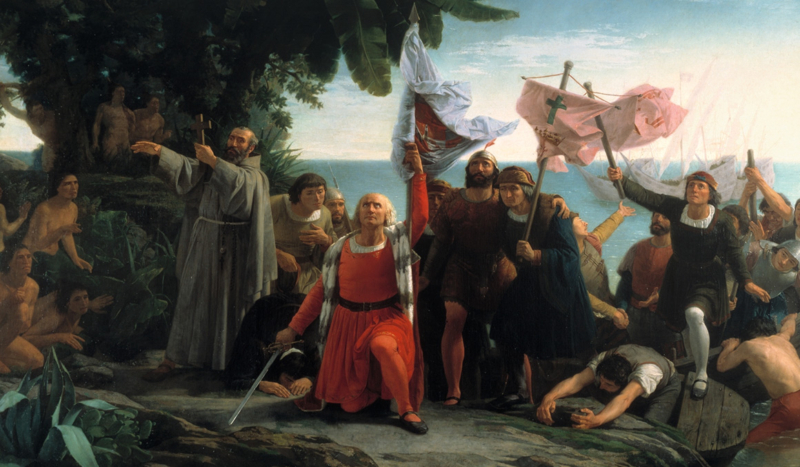
The First Landing of Christopher Columbus (1450-1506) in America, 1862 (oil on canvas) by Dioscoro Teofilo Puebla Tolin (1832-1901)
CV NEWS FEED // The Archbishop of New York, Cardinal Timothy Dolan, has issued an open invitation to Catholics to join him for a Columbus Day Mass at New York City’s iconic St. Patrick’s Cathedral in October.
“It is my pleasure to invite you to the 47th Annual Columbus Day Mass at Saint Patrick’s Cathedral on Monday, October 14 at 9:30 A.M,” the Cardinal announced in an emailed press release:
Admission is free, but tickets are required to enter the Cathedral until 9:15 A.M.
If you would like to reserve your free tickets, please visit Eventbrite. The last day to request tickets is Monday, September 30.
His Eminence, Timothy Michael Cardinal Dolan
ARCHBISHOP OF NEW YORK
The first celebration of Columbus Day in the U.S. dates to 1792, according to history.com. The celebration occurred in New York, right after the ratification of the Constitution. It commemorated the 300th anniversary of Columbus’ first expedition to and discovery of North America in 1492.
In 1892, President Benjamin Harrison commemorated the 400th anniversary, calling on Americans to “devote themselves to such exercises as may best express honor to the discoverer and their appreciation of the great achievements of the four completed centuries of American life.” In a presidential proclamation called for by both houses of Congress, Harrison declared, “In the churches and in the other places of assembly of the people let there be expressions of gratitude to Divine Providence for the devout faith of the discoverer and for the divine care and guidance which has directed our history and so abundantly blessed our people.”
In 1937, President Franklin D. Roosevelt declared Columbus Day a national holiday.
In recent years, especially following the riots and unrest stemming from the rise of the Black Lives Matter movement, the celebration of Christopher Columbus has come under increasing attack by left-wing activists. There have been demands to replace the holiday with “Indigenous Peoples’ Day,” and statues of Columbus have sometimes been vandalized or removed. The District of Columbia, which was named after Columbus, abolished the celebration of his holiday in 2019, replacing it with Indigenous Peoples’ Day.
Conservative voices have pointed out that despite the claim that opposition to Columbus Day celebrations is motivated by racial sensitivities, history proves the opposite to be the case.
Conservative writer Chris Tremoglie, writing for Broad and Liberty, states, “Many of the contemporary criticisms of Columbus echo the KKK’s attacks upon Italians and Catholics, when the hate group sought to erase Columbus from American history. Today, objections to celebrating Columbus come from radical leftist groups such as Antifa — effectively carrying on the KKK’s mission.”
“The KKK attacked celebrations of Columbus by promoting negative propaganda to denigrate Italians and Catholics,” Tremoglie wrote:
The KKK demonized Catholics as “gun-toting revolutionaries who mobilized around Columbus to take over the country.” The KKK intimidated a school board in Easton, PA., from erecting a statue of Columbus in 1929, because Columbus was an “alien” and “did not discover America and … a memorial of this kind would be very misleading to the future citizens of the city.” The KKK also terrorized a Richmond community until plans for a Columbus statue were eventually scrapped.
Perhaps the current rabble rousers direct invective at Columbus to distract from their true target: the American systems of capitalism and democracy. Using Columbus as a proxy allows an indirect discrediting of the foundations of our nation through manipulation of our historical roots to reshape American society to fit their radical standards.
The website The Truth About Columbus likewise details the KKK’s work to end Columbus Day celebrations and oppose the erection of statues in his honor. According to the website, in the 1920s, the KKK “attempted to remove Columbus Day as a state holiday in Oregon,” “burned a cross to disturb a Columbus Day celebration in Pennsylvania,” “ran an article titled ‘Columbus Day, A Papal Fraud’,” and “successfully opposed the erection of a statue of Columbus in Richmond, Virginia, only to see the decision to reject the statue reversed.”
Defending Columbus’ legacy for America, Jarrett Stepman argued in a 2019 commentary for The Daily Signal that in Columbus’ extensive journeys across the seas, “the explorer’s primary motivation was religious.”
“The truth is that Columbus set out for the New World thinking he would spread Christianity to regions where it didn’t exist,” Stepman writes:
While Columbus, and certainly his Spanish benefactors, had an interest in the goods and gold he could return from what they thought would be Asia, the explorer’s primary motivation was religious.
“This conviction that God destined him to be an instrument for spreading the faith was far more potent than the desire to win glory, wealth, and worldly honors,” wrote historian Samuel Eliot Morison over a half-century ago.
Upon returning to Spain from his first voyage to the Americas in 1493, Columbus expressed his religious sentiments and motivations in a letter to King Ferdinand and Queen Isabella. Speaking of the natives of North America, Columbus wrote, “They manifest the greatest affection towards all of us, exchanging valuable things for trifles, content with the very least thing or nothing at all. . . . I gave them many beautiful and pleasing things, which I had brought with me, for no return whatever, in order to win their affection, and that they might become Christians and inclined to love our King and Queen and Princes and all the people of Spain.”

